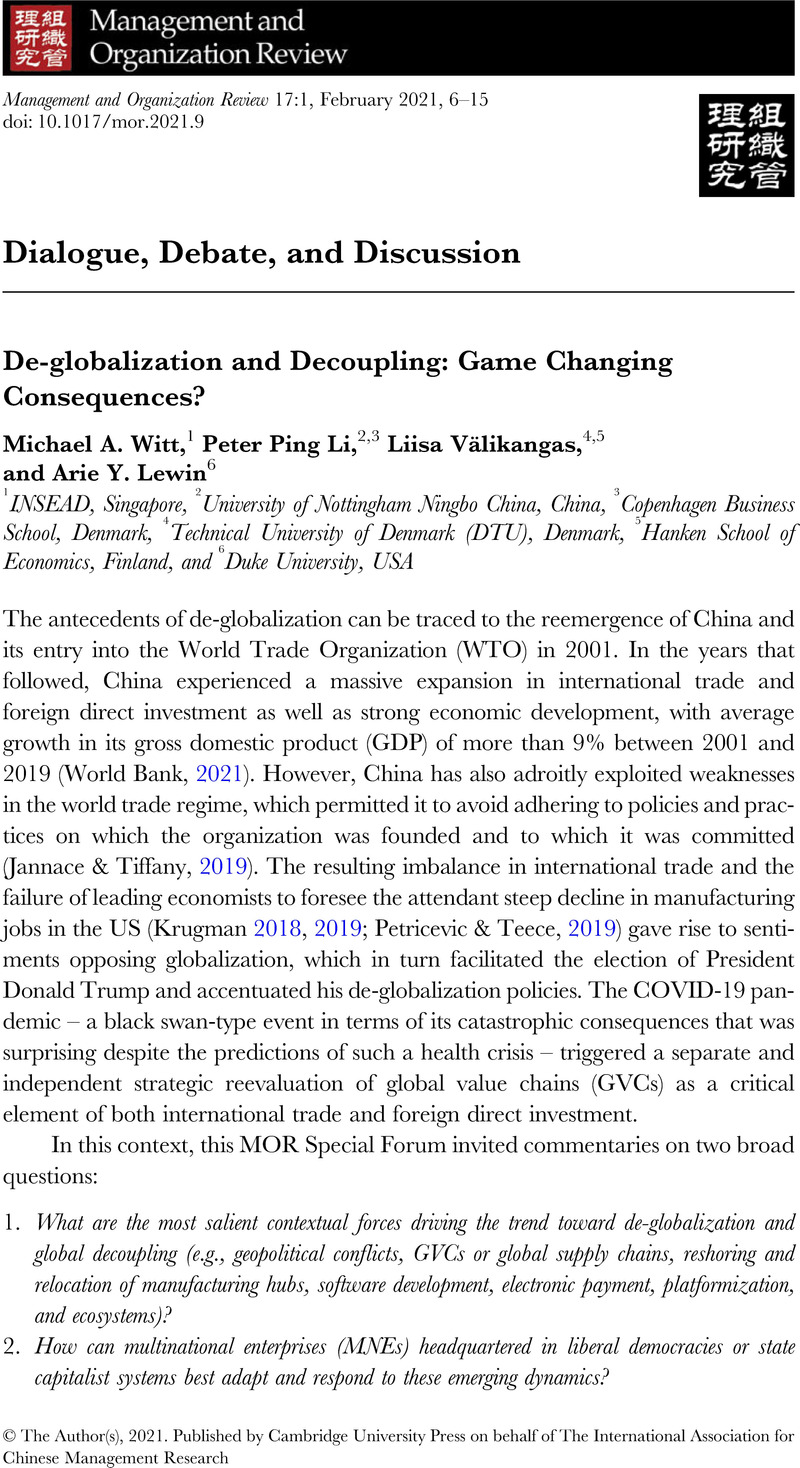Crossref Citations
This article has been cited by the following publications. This list is generated based on data provided by Crossref.
Tan, Hao
and
Yang, Mengying
2021.
The New Liability of Origin in Global Decoupling.
Management and Organization Review,
Vol. 17,
Issue. 3,
p.
624.
Tallman, Stephen
2021.
Comments on ‘Multinational Enterprises and International Cartels: The Strategic Implications of De-gobalization’ by Peter J. Buckley and Mark Casson.
Management and Organization Review,
Vol. 17,
Issue. 5,
p.
989.
Hu, Yimei
Tian, Kailan
Wu, Tian
and
Yang, Cuihong
2021.
The Lose-Lose Consequence: Assessing US-China Trade Decoupling through the Lens of Global Value Chains.
Management and Organization Review,
Vol. 17,
Issue. 2,
p.
429.
Li, Peter Ping
2021.
Globalization, Political Economy, Business and Society in Pandemic Times.
p.
221.
Wang, Liang
and
Xie, Zaiyang
2021.
An Outcome of Decoupling and De-globalization? The Weakened Impact of Internationalization on Innovation of Chinese Firms Since 2016.
Management and Organization Review,
Vol. 17,
Issue. 3,
p.
630.
Alvstam, Claes G.
and
Fang, Tony
2021.
Globalization, Political Economy, Business and Society in Pandemic Times.
p.
127.
Fang, Tony
and
Hassler, John
2021.
Globalization, Political Economy, Business and Society in Pandemic Times.
p.
1.
Curran, Louise
and
Eckhardt, Jappe
2021.
Why COVID-19 Will Not Lead to Major Restructuring of Global Value Chains.
Management and Organization Review,
Vol. 17,
Issue. 2,
p.
407.
2021.
Letter from the Editor.
Management and Organization Review,
Vol. 17,
Issue. 5,
p.
881.
Nguyen, Ha T. T.
and
Larimo, Jorma
2022.
Megatrends in International Business.
p.
251.
Lewin, Arie Y.
and
Witt, Michael A.
2022.
China’s Belt and Road Initiative and international business: The overlooked centrality of politics.
Journal of International Business Policy,
Vol. 5,
Issue. 2,
p.
266.
Dünhaupt, Petra
Herr, Hansjörg
Mehl, Fabian
and
Teipen, Christina
2022.
Economic and Social Upgrading in Global Value Chains.
p.
565.
Zhang, Chun
and
Gao, Hongzhi
2022.
Managing business-to-business disruptions: Surviving and thriving in the face of challenges.
Industrial Marketing Management,
Vol. 105,
Issue. ,
p.
72.
Liu, Yipeng
Bebenroth, Ralf
and
Yang, Yi
2022.
East-Meets-West: Mergers and Acquisitions challenges and opportunities in and out of Asia.
Asian Business & Management,
Vol. 21,
Issue. 5,
p.
715.
Sun, Sha
Xu, Haiyue
He, Minsong
Xiao, Yao
and
Niu, Huayong
2022.
An Alternative Globalization Barometer for Investigating the Trend of Globalization.
Applied Sciences,
Vol. 12,
Issue. 15,
p.
7896.
Virtanen, Yuan
Salmi, Asta
and
Qin, Xiao
2022.
Modern mediators: intermediaries’ informational roles in sourcing from China.
Journal of Business & Industrial Marketing,
Vol. 37,
Issue. 7,
p.
1553.
Wang, Molin
Yan, Haifeng
Ciabuschi, Francesco
and
Su, Cong
2023.
Facilitator or inhibitor? The effect of host-country intellectual property rights protection on China’s technology-driven acquisitions.
International Business Review,
Vol. 32,
Issue. 6,
p.
102165.
Ren, Monica
and
Gao, Hongzhi
2023.
Chinese State-Owned Multinationals' (SOMNEs) Subsidiary nonmarket strategies in Selective De-globalization: An integrated perspective of co-evolution theory and the yin-yang frame.
Journal of International Management,
Vol. 29,
Issue. 6,
p.
101069.
Yang, Guoge
and
Deng, Feng
2023.
Can digitalization improve enterprise sustainability?–Evidence from the resilience perspective of Chinese firms.
Heliyon,
Vol. 9,
Issue. 3,
p.
e14607.
Hong, Paul
Jagani, Sandeep
Pham, Phuoc
and
Jung, Euisung
2023.
Globalization orientation, business practices and performance outcomes: an empirical investigation of B2B manufacturing firms.
Journal of Business & Industrial Marketing,
Vol. 38,
Issue. 10,
p.
2259.



